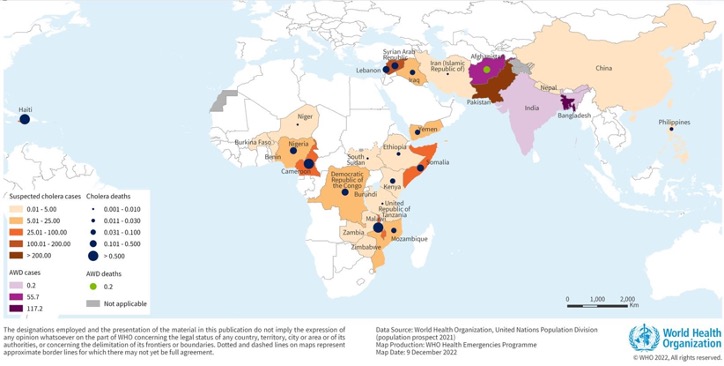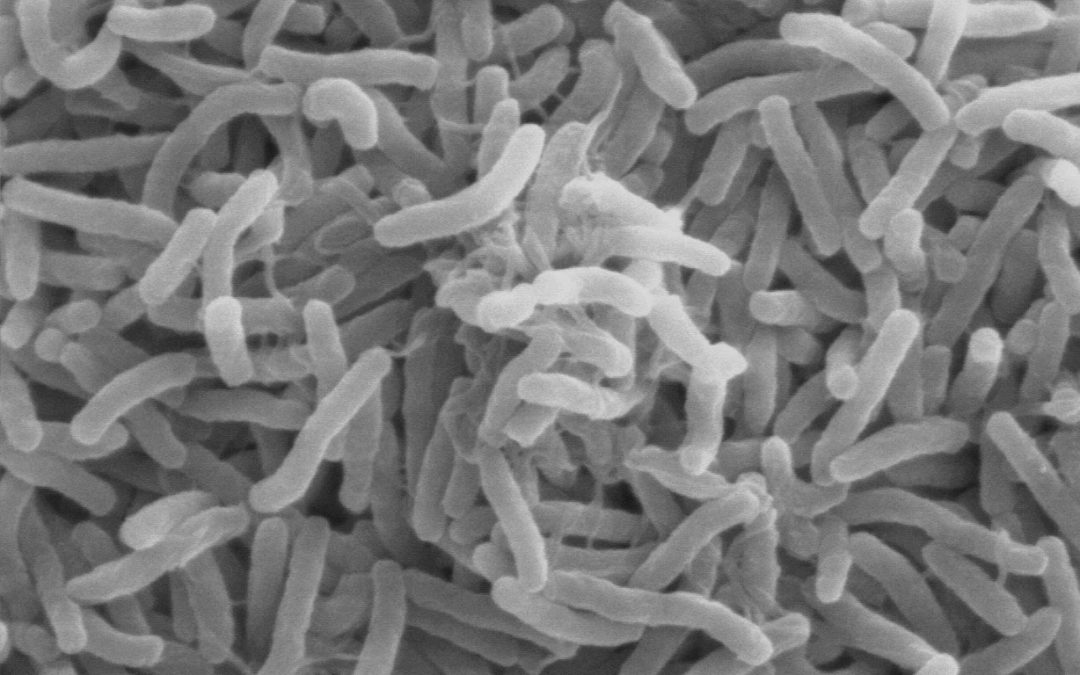For much of the year, Doctors Without Borders (MSF) has battled concurrent cholera outbreaks throughout the world. More countries have reported cholera outbreaks in 2022 than have been reported in the previous five years combined. Global health experts attribute the rise in outbreaks to several factors, including exacerbated drought, mass displacement due to natural and man-made disasters, and restricted access to clean drinking water.
What Is Cholera?
Cholera is a potentially fatal bacterial infection that spreads through contaminated drinking water. Cholera enters waterways through fecal matter creating higher risk in places with nonexistent or underdeveloped sanitation infrastructure. While cholera is not contagious, it spreads quickly amongst populations drinking from the same untreated water source.

After ingestion of the bacteria, people may experience symptoms such as severe diarrhea and dehydration which lead to electrolyte imbalances and more serious symptoms like shock/cramping. In severe cases, cholera can cause excessively low blood sugar and potassium levels. Without treatment, 1 in every 10 people infected will die from the disease. With a simple treatment—Cholera survival rates can exceed 99 percent.
Where Are the Outbreaks?
As of this writing, the World Health Organization (WHO) is monitoring cholera outbreaks in 29 countries. Many of these nations are experiencing multiple catastrophes that are exacerbating the crisis.

Syria reported its first cholera case in early September 2022. Since then, more than 15,000 people there have contracted the disease. Health experts believe reliance on untreated water sources and contaminated vegetables is driving the outbreak. The Syrian outbreak has led to a cholera resurgence in neighboring Lebanon, which reported its first case in more than three decades.
Across the Atlantic, Haiti reported a resurgence in cholera following weeks of instability. The island was cholera-free until 2010. The nation’s first outbreak claimed more than 10,000 lives. The incidence of new cases was decreasing significantly by 2019. However, the latest outbreak is poised to create a severe public health crisis.
Several African nations have also reported larger-than-usual cholera outbreaks, driven by a diverse array of climate-related disasters. In East Africa, excessive droughts have reduced the number of sources of potable water. Further, violent conflicts in Sudan and Somalia have forced millions of people into overcrowded and unsuitable refugee camps. In West Africa, unprecedented flooding in Nigeria has spread waste and other contamination into traditional water sources. Cameroon and Niger are also assessing their risk of cholera outbreaks.
While the globe is experiencing the highest rate of cholera outbreaks in recent memory, vaccine supplies are at an all-time low. Normally, two doses of the cholera vaccine can provide up to three years of protection. However, in order to adequately respond to the outbreaks, the WHO is limiting vaccines to one dose.
How Is Doctors Without Borders (MSF) Responding?
MSF is delivering a multipronged response to the growing health crisis. MSF has aligned with the WHO to modify its cholera vaccination program to protect more people despite limited supplies. The organization provides services directly in areas with highly vulnerable populations, such as refugee settlements and neighborhoods with high population densities.
To connect people to much-needed medical resources, MSF staff implement a door-to-door health check strategy. After identifying active cases, MSF routes individuals with active infections to immediate medical care. To reduce spread and contamination, the staff also treat local water sources with chlorine and disinfect homes.
In partnership with local medical providers, the organization works to treat and educate vulnerable populations. For example, many people in Lebanon are unfamiliar with cholera symptoms, as the disease was previously rare. Medical staff run education campaigns so that locals can recognize the symptoms and prevent disease transmission.
The organization manages mobile clinics designed to treat cholera in low-resource settings. These clinics provide basic but effective cholera treatments, such as oral rehydration salts, and administer intravenous fluids to treat severe cases. MSF sometimes places mobile clinics alongside existing medical centers to handle patient overflow during cholera outbreaks. In remote regions, MSF establishes cholera treatment centers near populated areas. MSF staff use these clinics as a base, transporting portable medical care to those in isolated areas.
MSF addresses the root of outbreaks by improving sanitation and access to potable water. While final solutions vary based on the climate and the population’s needs, MSF deploys emergency waste disposal systems to prevent water contamination. The organization increases the clean water supply by repairing broken infrastructure or importing potable water. MSF also teaches water sanitation techniques, such as using filters or heat to remove contamination.

